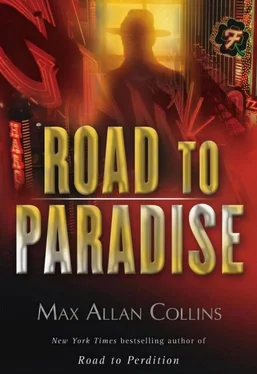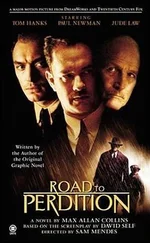But he would. He would. Gently. One of these days. Nights.
He felt almost guilty about how well he was adjusting himself. He had made harder adjustments before — when he and his father left their house in the middle of the night, several lifetimes ago, they’d had more than just a threat of violence hovering: they’d left behind the corpses of Mama and brother Peter. Going to a great town like Tucson in a beautiful state like Arizona was hardly as hard as living out of a Ford and sleeping in Bonnie-and-Clyde motels and robbing banks, on the road to Perdition.
He’d been Michael O’Sullivan, Jr., a kid in Rock Island, Illinois. He’d been the Angel of Death’s getaway driver, written up in newspapers all over. He’d been Michael Satariano, a teenager in DeKalb. He’d been Michael Satariano the war hero. He’d been Michael Satariano the mob enforcer. And he’d been Michael Satariano the casino boss.
Being Michael Smith, the restaurant manager, was no strain.
And Tucson — its nine square miles stretched over the broad desert valley of five mountain ranges — was a great city, the best place he and his family had ever found to live; the girls would surely come to love it as he already did. He found the stark, arid city strangely soothing, and relished the dry heat, the wide-open sky, the horizon jagged with mountains of ever-shifting shades of red and deep blue.
The Tahoe area had wrapped itself in a pretend frontier feeling; but at heart it was a great big tourist trap. Tucson, on the other hand — with its wide paved streets, dotted with pepper and orange trees, feather-leafed tamarisk, and even Italian cypress — had a genuine easygoing vibe, informal, unhurried, blue jeans and short skirts year around. In his suits and ties, Michael was a regular dude in this culture, with its Spanish, Mexican, and American Indian roots; cowboy hats and sombreros were common in Old Pueblo, as the longtime residents called the town.
Other old-timers had another name for Tucson: “Paradise of Devils.” This dated back to outlaw days, when the horse thieves, gunslingers, gamblers, and other “varmints” called Tucson home; the Clanton gang, Wyatt Earp, and Doc Holliday had walked these streets when dusty hard dirt had been underfoot — that is, when they weren’t over in nearby Tombstone (Earp had been a marshal, too).
Michael related to this, on a deep, secret level — hadn’t he and his father been among the last of the great outlaws? He remembered when an old-timer at Tahoe had told him that Baby Face Nelson and John Dillinger had used the Cal-Neva as a hideout in their heyday; and he’d thought, You mean... in my heyday ...
The Cal-Neva, of course, was history — as ancient as Baby Face and Dillinger. If Michael no longer had the responsibility of a casino resort and all its wide-ranging problems — and its considerably bigger paycheck — he was nonetheless content with his new command, a restaurant on trendsetting North Campbell Avenue.
Vincent’s — whose namesake had been an embezzler and tax dodger, hence the current owner being Uncle Sam — was, as the boys back in Chicago would say, a class joint. Floor-to-ceiling windows provided a view of the city lights in a hacienda-style facility, though the cuisine was not Tucson-style Mexican, rather Continental specialties like lamb Wellington and veal Sonoita. The chef — a Russian Jew who called himself Andre — was four-star, and made a salary equal to Michael’s... and worth every penny.
Michael, like most men of his experience, had expected to walk in and immediately begin making notes about sweeping changes. Instead, he’d found nothing not to like, and his gaze took in only perfection: fine china with pale-pink linens, fresh flowers, classical music. Everywhere he looked he saw elegance — from the beamed vaulted ceiling with its glittering chandeliers to the stone floor, from the framed western landscapes to a massive fireplace, which saw action only in winter.
He was a general stepping in to take over an army from a retiring general of great skill. Vincent may have been a crook — with a gambling habit — but he had certainly also been a fine restaurateur. Michael could not have hoped for a better situation. The job took time and expertise, but for all of that was not stressful.
The staff had been so well-trained by the former owner that the place — overseen by the assistant manager for six months — was running quite well on fumes. The only person having difficulty was that overworked assistant, who was glad to be relieved of some of her duties, anyway.
The assistant, Julie Wisdom — a lovely divorcée in her early forties — was aptly named but for a troubling tendency to flatter and flirt with her new boss. He found himself attracted to this intelligent brunette, and fought stirrings that weren’t helped by Pat’s somnolent behavior at home.
Michael had always been a faithful husband, but with the world at work so much more pleasant and fulfilling than the one at home, he was tempted. Already he was falling into justifications and rationalizations... With what I’ve been through, with the stress I’ve been under, who could blame me?
But he had not yet acted on these impulses. Perhaps he was still “Saint” Satariano, at heart; or maybe he just still loved his wife, the woman who had taken this dangerous road with him even though he had warned her of his deal with the Chicago devil, the woman who had given birth to Mike and Anna, the pretty prom queen from DeKalb he had fallen in love with so many years ago...
On a Thursday evening, two months into their new life, Michael took Pat to Vincent’s for a romantic dinner. In part, this was to send a signal to his flirtatious assistant manager; but he also wanted to encourage Pat to rejoin the world. His world. Their world.
While not Pat’s first visit to Vincent’s, this was the first time their daughter hadn’t been along. Tonight Anna was staying with the neighbor girl, Cindy — desert-trail riding followed by a slumber party. And Michael and Pat were anxious for Anna to expand her circle of friends.
They shared Chateaubriand and an especially expensive bottle of French wine from Vincent’s cellar of over one thousand. In the candlelight, against a window of sparkling city lights, Pat looked lovely and even happy. They mostly talked about Anna, since Pat didn’t have anything else going in her life right now, except television and the household.
“This is going to be a hard weekend for our little girl,” Pat said.
“Really? Why?”
“Saturday night — back home? Prom.”
“...Oh.”
Pat sipped her wine. Then she shrugged with her eyebrows and said, “She still carries the torch for that Gary.”
“Well, he’s a handsome kid, nice enough. Star quarterback, president of the class... Hasn’t been any contact, has there?”
This time Pat shrugged her shoulders, which were bare; she wore a chic white dress, lace over a satin shell. “If so, she’s hiding the letters well. I’ve been through her things a thousand times.”
“Terrible.” He shook his head.
“What choice do I have?”
“Oh, I’m not being critical. It’s just... what this... situation reduces us to.”
She sipped her wine.
He nodded toward the cityscape in the window beside them and said, “Pat, if you gave this town half a chance, you’d really love it.”
“I don’t have any problem with this town.”
“Honey, you’ve barely seen it.”
“I’m just keeping a low profile, that’s all. Aren’t we supposed—”
“Actually, we’re supposed to live our lives.” He reached across the linen-covered table and took her hand. “And, darling, you need to start living yours. We need to start living ours.”
Читать дальше











